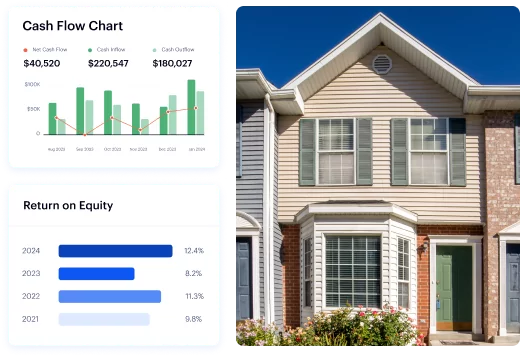Landlords have to pay taxes on rental property profits and capital gains like any other business. However, there are effective ways to minimize these taxes. This guide will provide you with practical ways to optimize your tax situation so you don’t have to pay a penny more than you have to.
Key Takeaways
- Deduct property depreciation over 27.5 years, significantly reducing taxable income.
- Lower taxable income by deducting operating expenses like property taxes, insurance, and maintenance.
- Benefit from capital gains tax exemptions when selling rental properties.
- Reduce taxable income through mortgage interest deductions, especially for mixed-use properties.
- Actively manage properties to classify earnings as business income and qualify for more deductions.
- Regularly review property tax assessments to ensure accuracy and minimize tax liability.
Say goodbye to spreadsheets
Get a consolidated ledger of all transactions categorized by property and Schedule E category.
Tax Advantages of Rental Properties
As a real estate investor, understanding the tax benefits of rental properties goes hand in hand with knowing how to structure rental property bank account setups to reduce rental income tax. Here are the key advantages:
- Depreciation Benefits: You can deduct a portion of the cost of your property each year (over 27.5 years) to reduce your taxable income.
- Deductible Operating Expenses: Deducting operating expenses, such as property taxes, insurance, and maintenance, can significantly lower your taxable income.
- Capital Gains Tax Relief: Selling a rental property held for more than a year may qualify you for capital gains tax exemptions to retain more profit from the sale.
Leveraging these tax benefits can lower your rental income tax and boost your investment returns.
Fannie Mae loans for 2-4 unit properties.
Low down payment, straightforward qualifications.
How is Your Rental Income Taxed When You Have a Mortgage?
Rental income taxation changes when you have a mortgage. Here’s what you need to know:
- Interest Deduction: Deduct the interest paid on your mortgage from your rental income. For example, if your annual mortgage interest is $12,000, subtract this amount from your rental income.
- Principal Payments: Remember, only the interest portion of a mortgage is tax-deductible, not the principal paid.
- Mixed-Use Property: If you use part of the rental property as your primary residence, only the interest attributed to the rental part is deductible.
Each factor plays a key role in calculating your tax obligations on rental income.
6 Tips on How to Reduce Rental Income Tax
1. Actively Manage Your Properties
To effectively reduce rental income tax, active management of your rental properties is key. Here’s why:
- IRS Business Classification: If the IRS views you as actively managing your properties, they classify your earnings as business income. This classification allows for the deduction of business expenses, reducing rental income tax.
- Time Investment Requirement: For the IRS to consider your rental activity as a business, you must invest at least 750 hours annually in real estate-related tasks.
- Service Level Impact: The extent of your involvement in tasks like maintenance and repairs influences whether the IRS regards you as an active business owner. Delegating these responsibilities could shift you into the passive investor category, affecting potential tax deductions.
Active rental income management positions you as a serious business owner in the eyes of the IRS and opens avenues to avoid paying higher taxes on rental income.
2. Track and Deduct All of Your Expenses
As a landlord, maximizing your deductions is a fundamental aspect of how to reduce rental income tax. If your expenses are both necessary and ordinary, you can deduct them from your taxes. This includes:
- Maintenance and Repairs: Costs for labor and materials fall under deductible expenses.
- Turnaround Costs: Expenses such as cleaning and advertising are also deductible.
- General Expenses: Items like rental property insurance are standard deductions.
- Travel Costs: Deduct the mileage for trips to and from your rental properties.
- Loan Interest: The interest on mortgages and other loans related to your property is deductible.
- Professional Fees and Home Office: Fees paid to professionals, along with your home office expenses, can reduce your taxable income.
- Property Tax and HOA Fees: These costs are often overlooked but are deductible expenses.
To effectively avoid paying taxes on rental income, maintain meticulous records of all your expenses.
Rental property bookkeeping software can help you manage your receipts and give you a clear picture of what you can deduct on your Schedule E.
Learn more about what you can deduct in our article on 10 tax deductions you can claim as a landlord.
3. Depreciate Capital Investments
In addition to direct expenses, you can deduct depreciation on capital items, which is a key strategy for reducing rental income tax. Depreciation accounts for the natural decline in the value of assets over time.
While the land a property is on doesn’t depreciate, the building itself does. This means you can deduct the house depreciation each year from your taxes. Major improvements, such as replacing the roof, installing a new HVAC system, or updating all the windows, are also eligible for depreciation deductions. This approach is among the best ways to reduce taxes, allowing you to offset the cost of maintaining and improving your rental property.
4. Make Borrowing Your Friend
Borrowing can be a strategic approach to reducing rental income tax. By amortizing expenses, you improve cash flow and benefit from tax deductions.
The IRS lets you deduct all the interest paid on loans for your rental business, which includes mortgages, unsecured loans, lines of credit, or balances on business credit cards. This is an effective way to avoid paying higher taxes on rental income.
For example, if you spent $1,000 in cash on property maintenance in a year, you can deduct that $1,000 on your taxes. If you borrow to pay for that expense, you keep the $1,000 in cash, and you can also deduct the interest you pay on the loan.
The upside is that you get more leverage to scale your rental property portfolio. The downside of this strategy is that your debt-to-income ratio determines what kind of financing you can get for your next investment property.
You can learn more about Baselane’s comprehensive set of rental loans here.
5. Plan to Reduce Capital Gains Tax
If you plan to sell a rental property, you must pay capital gains tax of up to 20% on your profits. However, you can use the following strategies to reduce capital gains and save property tax.
Take advantage of the primary residence exemption
When you sell your primary residence, you can exclude up to $250,000 of gains on selling a property ($500,000 if you’re married and filing jointly). To claim the exemption, you must have used the property as your primary residence for at least 2-5 years before the sale.
The amount you can exclude depends on how long you lived in the home compared to how long you rented it out. For instance, if you lived there for two years, rented it out for three years, and then sold it, you could claim two out of five exemptions or $100,000.
Defer and eliminate capital gains tax with estate planning
If your rental properties have become a family business, careful estate planning can help you avoid capital gains tax when you retire. This is a strategic way of using rental property to reduce taxes in the long term.
Selling your property triggers a capital gain. Gifting property to a family member triggers the gift tax, which is 18% to 40% of the property’s fair market value, with only a small exclusion permitted.
However, tax rules are much more generous when it’s an estate gift. The first $12.06 million of an estate isn’t subject to federal estate taxes, and each property’s cost basis gets “stepped up” on inheritance, effectively preventing capital gains.
This means if you inherit a house and sell it, you only pay taxes based on the value change from the day you inherited it.
6.Review Your Property Tax Assessment
You need accurate property tax assessments to minimize your tax burden. Follow these instructions for how to review your rental property tax assessment and take necessary action:
Obtain your property tax assessment
Local tax assessors mail property tax assessments to homeowners every year. Sometimes, the assessment information can be found online on county or municipal websites. Make sure you have your most recent property tax assessment.
Review the assessment details
Check the rental property tax assessment for errors or inconsistencies. Key factors to check include:
- The assessed property value
- Classification
- Exemptions
- Any recent property improvements or changes that may affect the assessment.
You can also see if your property is fairly assessed by comparing its assessed value to other properties in your neighborhood.
Ensure the accuracy of the assessed value
If you believe your property’s assessed value is incorrect, gather supporting documentation to justify your claim. This documentation may include:
- Recent appraisals
- Comparable sales data
- Information on property improvements that could affect the property’s value.
If you are unsure about the accuracy of your property’s assessed value, consult a real estate professional or property tax consultant for guidance.
Appeal assessment if necessary
If you find discrepancies in your property tax assessment or believe the assessed value is too high, you can appeal the assessment. The process for appealing a property tax assessment varies by jurisdiction, so make sure you know what the deadlines and procedures are. In general, you submit a formal appeal, provide documentation to back up your claim, and attend a hearing if required.
Stay informed about local property tax laws
Property tax laws and assessment procedures vary between jurisdictions and can change over time. To make sure you’re aware of any changes to your property tax assessment or the available deductions, exemptions, and tax relief programs, you need to know local property tax laws. Stay up-to-date by reading local news, visiting your local tax assessor’s site, or attending community meetings.
Reviewing your rental property tax assessment involves the following:
- Obtaining the assessment.
- Examining the details for accuracy.
- Appealing the assessment if necessary.
- Staying informed about local property tax laws.
As a rental property owner, the best way to reduce taxes is by actively managing your property’s financial aspects. This approach not only helps ensure you pay a fair amount of property taxes but also keeps you compliant with vacation home tax rules, minimizing your overall tax burden.
Final Thoughts: Minimizing Your Rental Property Taxes
Managing taxes on rental properties is about being smart with your deductions and planning well for property sales. Using accounting software for real estate flippers can help you stay organized and track every deductible expense. This way, you keep more of your earnings instead of handing them over to the IRS. A few simple steps can make a big difference in reducing rental income tax.
For a streamlined approach to managing your rental property finances, consider Baselane as an all-in-one platform for banking, bookkeeping, analytics, and rent collections, saving you time and boosting investment decisions.
What expenses can you write off?
Get a list of the most common deductible expenses for rental properties.
FAQs
The IRS receives reports from a variety of sources they use to look for tax returns that don't look quite right. Reports from your bank, municipal licensing, property tax records and even whistleblower reports from a disgruntled tenant can all be used as grounds for an audit. It’s best to keep your bookkeeping in order and save all your receipts. You can use Baselane’s platform to stay organized and ahead of the IRS.
Landlords pay tax only on their rental property profits at their marginal rate.
For example, if you received $25,000 in rent payments and had expenses of $20,000 in a year, you would pay tax on the $5,000 profit.
If that profit was in addition to a salary of $75,000 from your full-time job, it would be taxed at a marginal rate of 22% meaning you would owe $1,100 in tax for the year.
It’s best to check with your local CPA or accountant for specifics on how much taxes you have on your rental income.
There is no tax exemption for a rental property income. However, your income is reduced at a 1:1 rate by your expenses including depreciation. Any profit you make in your rental business will be taxed at your marginal rate.
Rental accounting made easy
- Consolidated ledger of all transactions
- 1-Click Schedule E categorization
- Auto-generated financial and tax reports

Don't miss these

How Does a 1031 Exchange Work? A Comprehensive Guide
If you’re thinking about selling an investment property and buying another, a 1031 exchange is the best way to grow your portfolio while deferring capita...
3 October 2023
How to Create a Rental Property Expenses Spreadsheet | Free Template
No matter the size of your real estate portfolio, having a well-organized rental property expenses spreadsheet, or even a simple rental income spreadsheet,...
1 September 2023
Vacation Rental Income Tax | Rules and Rates 2025
Understanding taxes on vacation rental income is important for maximizing your earnings and staying compliant if you own a vacation rental. In 2025, the IR...
7 May 2025

